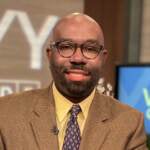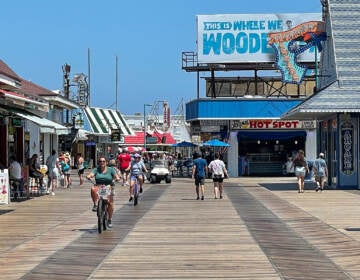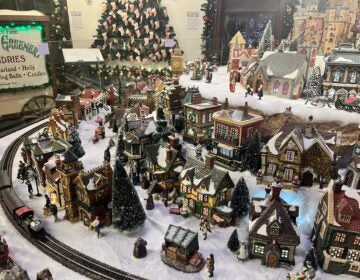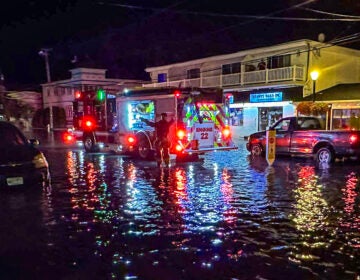Exchange visitors have returned to work at the Jersey Shore at pre-pandemic levels
A staple of resort towns, exchange visitors are again working along the Jersey Shore, taking in American culture and sharing theirs.
Listen 3:40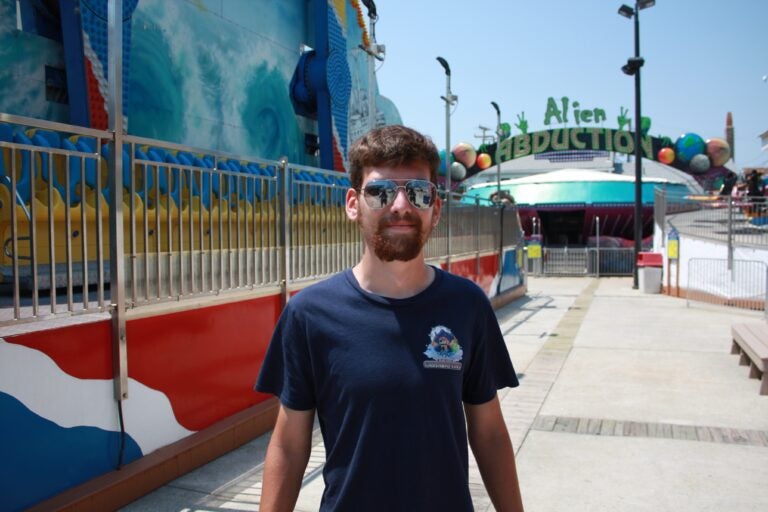
Yordan Yordanov, a business student from Bulgaria, is spending his second summer working at Playland's Castaway Cove in Ocean City, N.J., through an exchange visitor program. (P. Kenneth Burns/WHYY)
From Camden and Cherry Hill to Trenton and the Jersey Shore, what about life in New Jersey do you want WHYY News to cover? Let us know.
Yordan Yordanov is spending his second summer in a row in New Jersey.“It will remain my second home for life,” he said. “Even though I’ve been here…overall, six months.”
Yordanov is from Bulgaria and has always wanted to see what life is like in America. He is in the United States on a J-1 visa, which allows overseas residents to enter the country on a work-study visitor exchange. He is one of 25 overseas students working at Playland’s Castaway Cove in Ocean City, New Jersey, this summer.
The boardwalk attraction employs 300 people overall during the summer tourist season. On any given year, Playland employs between 20-25 exchange visitors, according to Brian Hartley, vice president of the boardwalk attraction.
“We pretty much try to just keep it to that,” he said. “This way we can really make sure that they’re taken care of.”
Though COVID is still a pandemic, according to the World Health Organization, Hartley hopes life does not return to the early days of the public health emergency.
“We had a lot of kids who were afraid, parents were afraid for the kids to get a job, especially here,” he recalled, “you’re collecting tickets from people, you’re kind of touching them, people are sitting in seats, and someone else is sitting in it. We were going around washing them between every ride.
Playland also didn’t receive any overseas help in 2020.
The federal government under the Trump Administration suspended J-1 visas as it tried to limit the spread of COVID, according to the American Immigration Council. Restrictions were eased the following year under the Biden Administration. However, there was a backlog in American embassies overseas.
Hartley said things have slowly returned to pre-pandemic levels.
“In 2021, I think we only have four or five [students,]” he said. Then it was a slow start getting going in 2022. A lot of the embassies were still closed for a while. But everyone now is really back into the full swing of things.”
A State Department spokesperson said that substantial improvements were made last year in reducing wait times across all visa categories.
For the last couple of years, the Alliance for International Exchange reported that more than 4,900 overseas students came to the U.S. for a summer work travel program.
Lisa Murray, director of the exchange program at the American Immigration Council, said she is also seeing a return to pre-pandemic activity in exchange programs.
“It’s taken us a few years to kind of get back up to our pre-COVID numbers. I would say that we are definitely there now.”
J-1 visas grand scheme is diplomacy
J-1 visas have been in existence since the 1960s when the Mutual Education and Cultural Exchange Act was instituted. The initiative allowed people into the United States to study and build experiences with host organizations.
“By doing these exchanges, you’re placing people in the US, they’re taking that experience, they’re returning home, and they’re sharing that experience,” said Murray. “That’s where kind of the diplomacy helps out.”
According to the State Department, New Jersey was in the top 10 for summer work travel destinations. But Murray said exchange visitors in resort areas get to share their culture with different people while experiencing different types of American culture.
She adds there are other opportunities available to exchange visitors.
“The other categories are interns and trainees, research scholars, teachers, and au pairs. With the summer work travel,” Murray said.
Entering the U.S. on a J-1 visa is a several-month process
- For a company to hire an exchange visitor, they would have to reach out to a program sponsor to facilitate the process. “They’re going to vet you as a host organization to determine your eligibility to participate as a host,” according to Murray. She said the American Immigration Council might participate in the vetting process.
- For the exchange visitor who want to participate in an exchange program, they would have to fill out an application with their educational background. The type of documents visitors are required to provide depends on the J-1 category. For example, a research scholar will have to provide an invitation letter that explicitly states the project in which they would be participating. An intern or trainee would need to provide an employment verification.
- The program sponsor will review all of the documentation.
- If the program sponsor approves the application, the visitor receives a DS 2019 form to present at their visa interview. The form is used by the prospective visitor to apply for a J-1 visa at the U.S. embassy or consulate. The visa is the document needed to be allowed entry into the United States.
- Wait times at the embassy can be “the biggest unknown variable,” according to Murray. But the State Department website shows the wait times for various embassies and consulates.
- An exchange visitor will be financially responsible for costs including program sponsorship and visa application fees, travel expenses, accommodations, sickness/accident group insurance and daily expenses such as food and transportation.
This was the process for Playland to hire Yordanov for the summer:
- Playland’s hiring process begins as early as November. “We work with a couple companies, we give them the job description [and] they will put that out there to probably 1000s students,” said Hartley, Playland’s vice president.
- Yordanov said he applied for his positions in January and was accepted in February. He had two visa interviews in April and May.
A mutual exchange on the Jersey Shore
Hartley said exchange visitors fill an important gap in the summer tourist season; the last weeks of August. That’s when a lot of domestic students begin to head back to college, high school athletes begin preparing for fall sports and parents decide on one last trip for the family.
Most students he hires are primarily from Kosovo, Romania, and Bulgaria. That’s because of the timing with the summer tourism season and their academic year.
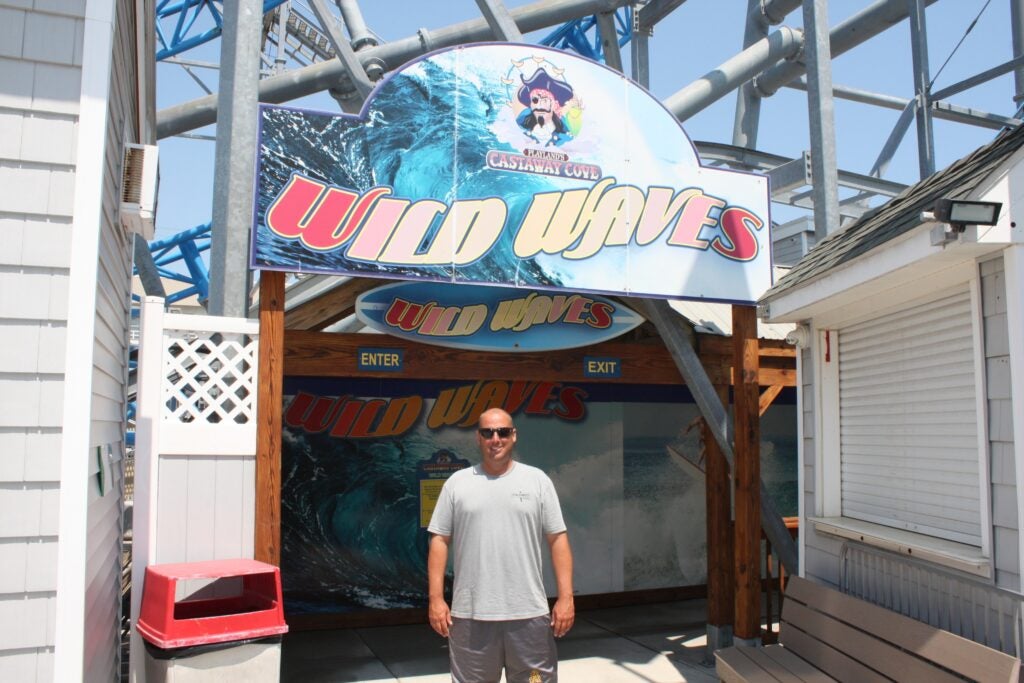
But Hartley adds they’ve hired students who weren’t from Eastern Europe as well.
“This year, we have our first from Thailand,” he said. “We’ve had Jamaica, Ireland, Spain, France; we’ve kind of had a great mixture of kids from all over the place.”
Hartley adds it’s not all work for the overseas students that work for him.
“We’ll have a miniature golf tournament that we’re going to do with all the kids. We have a couple employee parties after the park closes,” he said, adding they encourage the students to travel during July, when there is enough staff available.
“They go down to Miami, DC, New York…Philadelphia, you know, offers a lot of different things,” he said. “They’re here not only to work, but for the cultural experience as well.”
Yordanov, who is studying business back home in Bulgaria, hopes to take what he is learning along the Jersey Shore and use it to start his own clothing business after he graduates.
“I’m asking a lot of questions to the owner [and to] Brian about how they advertise the amusement park…I don’t think it’s on TV or stuff,” he said.
Yordanov also hopes to get some travel in as well. He visited Philadelphia last year, and though it was shortened by the weather, it was long enough for him to have a cheesesteak.
“I loved it,” he recalled. “They said Philadelphia has the best cheesesteaks.”
This year, he hopes to visit Philadelphia again. But Miami is at the top of his list of destinations, in addition to the Grand Canyon in Arizona.
Though Yordanov loves New Jersey, he admits, “If I fall in love with Miami, I will make it my second home.”

Saturdays just got more interesting.
WHYY is your source for fact-based, in-depth journalism and information. As a nonprofit organization, we rely on financial support from readers like you. Please give today.


